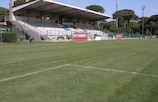Vilda confident Spain can bypass obstacles
Tuesday, May 17, 2011
Article summary
Wholly satisfied by the style in which Spain got to the finals, coach Ángel Vilda hopes his side can negotiate school exams and "an incredibly strong group" to at least reach the last four.
Article top media content

Article body
Ángel Vilda was left "wholly satisfied" after his Spain side won three out of three in the second qualifying round and is targeting at least a semi-final berth at the UEFA European Women's Under-19 Championship. The finals kick off in north-east Italy on 30 May, and Vilda hopes his side have the opportunity to "showcase our work" even if some players are juggling school exams.
UEFA.com: How do you see your team fairing against Germany, Norway and the Netherlands in Group B?
Ángel Vilda: The team will go there full of hope but aware of the difficulties that await because this is an incredibly strong group. We have to give our all because this is also about qualifying for the [FIFA U-20] World Cup. Some of the girls have exams during the tournament so we hope nobody will have to miss out.
UEFA.com: What are your objectives going into the tournament?
Vilda: What we have done until now has given us a huge lift and we're going there to try to compete – we always do. We'll look to see how the first game pans out and then what we can do in the subsequent matches. Our number one priority is to finish first or second in the group and qualify for the World Cup.
UEFA.com: Who do you think will be your trickiest opponents?
Vilda: Germany are always the favourites going into a major competition: their infrastructure, number of registered players and experience means they are always the ones to beat. The rest of us live in hope.
UEFA.com: Do you think it's difficult for the women's game always being in the shadow of the men's game?
Vilda: We're making a huge effort to promote the women's game. What is perhaps missing in Spain at the moment is an increase in the amount of playing licenses. For that to happen we need girls to be starting out at a much younger age; at seven or eight at the latest.
It's important to campaign on social and cultural fronts, and find a way through in physical education in schools. Having a model where the girls can gain knowledge of the sport would help. There's no doubt they want to play; there's a massive demand, but there must be competitions organised between schools because while that is not happening it will always be very difficult.
UEFA.com: How much influence did last season's UEFA Women's Champions League final in Getafe and the success of Rayo Vallecano de Madrid in the competition have?
Vilda: Everything helps. That's why it's important for us to do as well as we can in big international tournaments because that's where we can showcase our work and increase the media coverage. All of the above has to help so that the women's game [in this country] can reach the level enjoyed in other big European nations.










